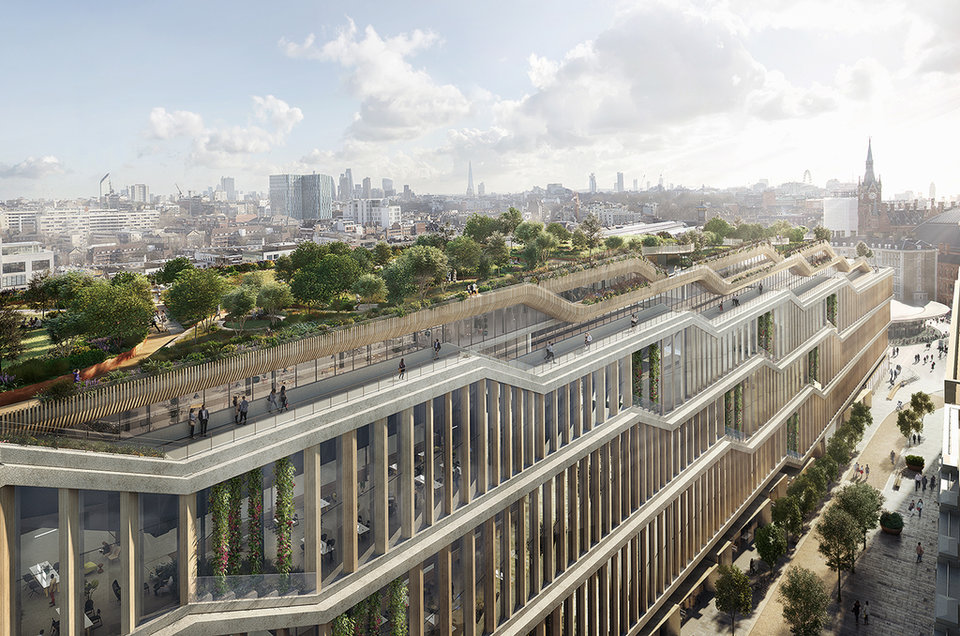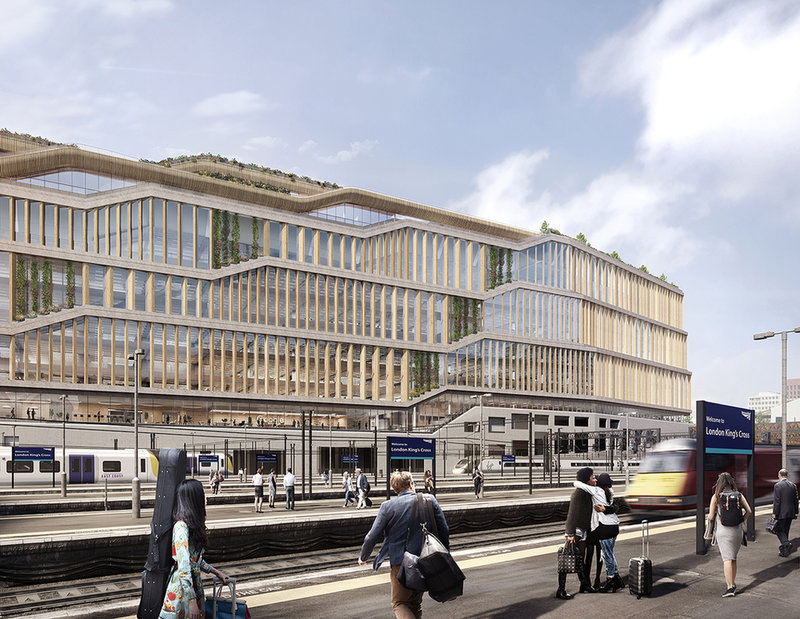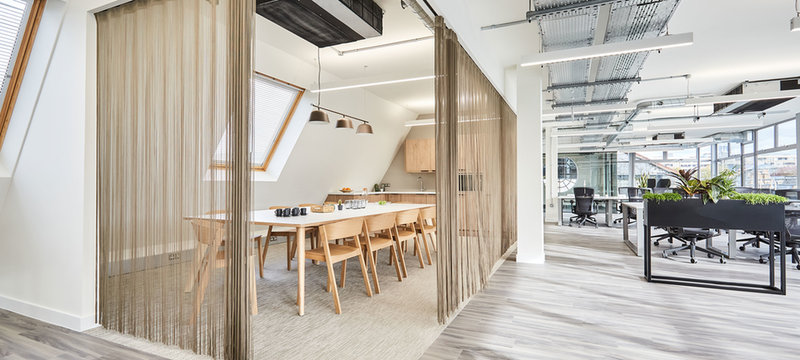Urban development
Destination office: Reviving London’s King’s Cross tech hub
London’s thriving tech hub as King’s Cross came to a halt when the Covid-19 pandemic shut offices, but what will a shift to working from home mean for the flagship offices in development for tech giants Google, Facebook & co? Luke Christou looks into the future of tech real estate in London and the emergence of the ‘destination office’.

H
ome to tech giants, growing startups, incubators, co-working spaces and ample early-stage investors, London’s King’s Cross district has everything it needs to thrive as the UK’s answer to Silicon Valley.
Soon, Google’s new ‘landscraper’ headquarters, spanning more than 90,000 square meters and standing 11 stories tall, will serve as a centrepiece among the growing tech cluster. Estimated to cost £1bn, the sprawling development will take the search giant’s capacity in the King’s Cross area to 7,000 office spaces, despite it employing just 4,500 workers across the UK.
Google will be neighboured by Facebook, whose new 57,000 square metre London home is expected to be completed soon, doubling the social media giant’s current footprint in the capital.
Previously hailed for its ‘considerable expansion opportunities, great transportation access and vibrant community’ by Facebook’s head of global rest estate, Rob Cookson, the redevelopment of King’s Cross as a tech hub looked set to be completed in 2021 with the opening of these vast developments. However, the Covid-19 pandemic has presented a challenge to future expansion.
The remote working shift
The rise of remote working during the pandemic has raised questions about the need for office space in certain industries, such as tech.
TechHub, a shared office space provider located in East London Tech City, has housed hundreds of promising tech startups since its launch in 2010, such as Divide, Bloomsbury AI and SwiftKey, since acquired by Google, Facebook and Microsoft, respectively. However, the popular hub for growing startups and entrepreneurs filed for administration in August 2020 after revenues fell by 75% due to Covid-19.
Even as lockdown measures were eased in the UK last summer and Prime Minister Boris Johnson urged Londoners to return to their places of work, a survey by Morgan Stanley found that just a third of office workers returned to their desks.
This pandemic has left areas such as King’s Cross largely desolate, causing fears that a permanent shift to remote working could have a drastic effect on the King’s Cross ecosystem, with surrounding businesses suffering from the loss of a lunchtime economy.

King’s Cross emerged as London’s tech hub in recent years with major tech companies, startups, incubators and investors setting up offices in the district.
The future of King’s Cross
While Google parent company Alphabet appeared to go off the idea of a permanent shift to remote working the longer Covid-19 persisted, CEO Sundar Pichai recently announced that the company was relaxing its stance. The search giant is now set to allow up to 20% of its workforce to work from home permanently following the pandemic, with an additional 60% required to work in the office for only a few days per week.
DeepMind and YouTube, both owned by Alphabet and located within the King’s Cross cluster, will presumably apply the same flexible approach.
Facebook’s stance, on the other hand, is considerably more straightforward. The company recently told the BBC that it thinks remote working is ‘the future’, with workers invited to continue working from home even as offices reopen.
The King’s Cross area has always been a part of London’s fabric historically and will remain a desirable city spot for businesses, tourists and residents.
This raises doubts about the continued development of King’s Cross and projects such as the Facebook and Google HQs. However, John Brash, founder and CEO of real estate and destination branding agency Brash, believes the area’s appeal as an ‘urban’ destination will continue to attract ample crowds even if flexible and remote working persists.
“With Coal Drops Yard and Granary Square, the Francis Crick Institute, as well as various retail flagships located in the area, the King’s Cross tech cluster has evolved into an ‘urban’ tourist destination, similar to the High Line in New York City, where tech, arts and culture all thrive together,” Brash explains.
“The King’s Cross area has always been a part of London’s fabric historically and will remain a desirable city spot for businesses, tourists and residents, continuing its evolution from industrial centre, to tech cluster, and now cultural space, despite the increase in flexible working.”
The destination office
Leading tech firms, from Google, to Microsoft and Twitter, are preparing for a permanent shift to some form of remote working. Yet, the past year has shown that working from home has its downsides, from poor collaboration to the loss of socialisation.
“Although the last year has felt like one big social experiment with most of the workforce operating out of their own homes, we don’t think this will be something that becomes a permanent change, and it is certainly not the ‘work from home revolution’ that was heralded in early 2020,” says Leeson Medhurst, head of strategy at office design firm Peldon Rose.
However, the office as we know it seems primed for change. According to Medhurst, businesses will need to start viewing their offices as a ‘destination’, which will encourage staff to commute in for specific reasons such as to collaborate or socialise.
“This new relationship with the office will not necessarily result in companies downsizing,” Medhurst explains. “At Peldon Rose, we’re predicting a shift to create more open, social areas to support this new ‘destination’ working model. In order to create these spaces, businesses will need to work with, or expand, the space they currently have, not reduce it.”

Peldon Rose recently fitted out Thirty Lighterman, a new co-working space for the growing King’s Cross tech cluster. Credit: Peldon Rose.
King’s Cross is primed to thrive
The destination office concept will be nothing new to King’s Cross’ thriving tech cluster. From the climbing wall inside Google’s Zurich office, to the abundance of shops, bars and restaurants on Microsoft’s Washington campus, big tech has taken an unconventional approach to office design for some time.
Once Google opens the doors to the landscraper, its London-based workers will have access to ample rooftop gardens, a 25m swimming pool, and an indoor basketball court. Like many recent developments within the tech cluster, the space will be well designed to offer workers a destination, rather than a desk.
“Due to the recent development and investment in the area, a lot of the businesses based in King’s Cross currently have these more destination geared spaces, meaning the transition post-pandemic will be seamless,” Medhurst says.
In terms of further growth and development for the London tech cluster, we’re still expecting some major developments over the next few years.
And with ample funding provided by the pandemic, King’s Cross tech cluster could continue to grow in its wake. While many industries have struggled during the past year, tech is one of the few sectors to have benefitted.
In 2020, the stock price of tech’s big five - Facebook, Apple, Microsoft, Amazon and Google - rose by 44% on average. Likewise, according to research from Dealroom.co and London & Partners, investment in London-based tech firms in 2020 was significantly higher than in 2017 and 2018, and just $200m short of the record $10.7bn set in 2019.
Despite the current remote working situation, Google recently leased an additional 6,500 square metre space nearby its future King’s Cross location. Pharma giant GlaxoSmithKline has also invested in a new £10m artificial intelligence hub in the area, where it will apply technology to solving serious illnesses such as cancer, while Hong Kong-based fashion tech incubator The Mills Fabrica will open its first international space in the area later this year.
“In terms of further growth and development for the London tech cluster, we’re still expecting some major developments over the next few years,” Medhurst insists. “These businesses have seen huge upticks in sales, usage and downloads over lockdown, so heavy investment could be on the way.”
Main image: Google’s new office at King’s Cross. Credit: Hayes Davidson